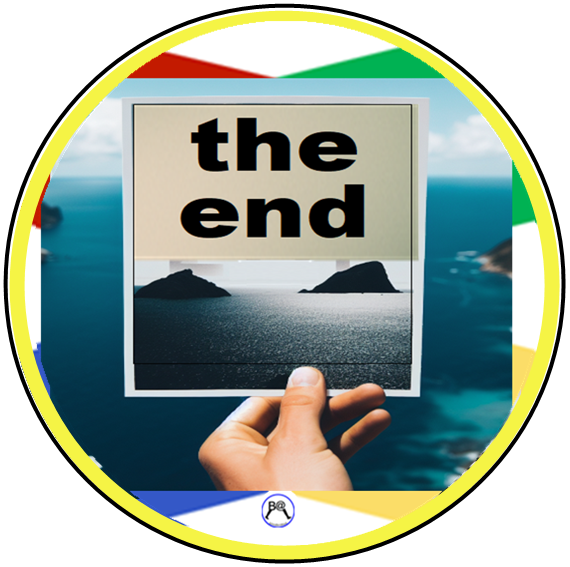
Imagine the end, when everything is done and over with.
At the risk of repeating myself, imagine you being dead.
Implied in you now dead is things have changed.
The easiest thing to do when faced with things have changed — which brings fear, is usually how it works — is to decide to become cynical or hope that the change you fear is nothing but a fad, soon to disappear.
The possibilities of you being dead are infinite.
Maybe a meteorite slammed into your house, or the sun exploded, or you died of a myriad of other possible causes, to name a few.
Of course, as long as you imagine your death, it hasn’t happened yet.
That’s because imagine is a word.
If you don’t know what a word is, I think it might be a good idea for you to read https://tinyurl.com/yjmjs7tu before heading head over heels into the rest of this post.
The rest of this post

We’re all in the story of you together.
Each of us was born Before Words — without words, wordless — and when our time has come, we’ll die After Words — wordless, without words again. There’s no way around it.
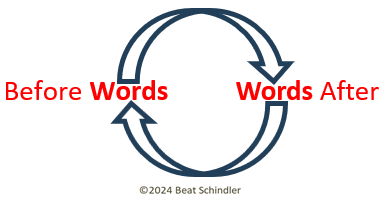
Words are a circle game. Wordless we originate and wordless we die.
Even our ancestors were in this story of you together — 13,750 years ago, when the age was stone, the Sahara green, Northern Europe under 1-mile-thick ice, and writing hadn’t been invented yet.
There’s no exception in the past and there isn’t any now.
Words accompany us only after when we learn them, between the ages of 1 to 6, and until before we breathe our last breath.
Naturally, it’s not just about the story of you.
There are three stories that each contain a Before Words and After Words.
- THE STORY OF EARTH
- THE STORY OF WORDS
- THE STORY OF YOU
You are free to believe the three stories above aren’t connected of course. But if you do, that means you also accept the attendant consequence. In other words, you preclude yourself from understanding words.
Because whenever you pick up one end of the stick, you pick up the other.
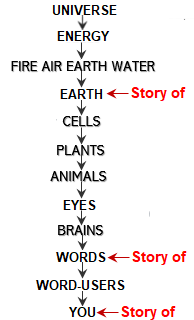
Since we’re talking about stories, don’t let me be misunderstood.
Whether a story happened or not doesn’t matter a Dickie bird. All that matters it’s believed.
THE STORY OF EARTH — of which there are multiple, depending on who you ask — everybody knows or has heard about it because it’s been told for thousands of years in families, kindergartens, churches and schools all over the world.
In stark contrast to that, no word-user knows THE STORY OF WORDS for the simple reason that THE STORY OF WORDS hasn’t been told for thousands of years in families, kindergartens, churches, and schools.
In fact, THE STORY OF WORDS is not told anywhere except in THE ORIGIN OF HUMANITY (218 pages) and now — in abbreviated form — here.
If THE STORY OF WORDS were told, it’d be the end of the richest organizations in the world.
The richest organizations in the world have known that in the beginning is the word from the start. They’ve lied about it for thousands of years with no end in sight.
While that’s a different story altogether, it more than explains why the vast majority of word-users see THE STORY OF WORDS told for the first time — albeit in abbreviated form — here, as we speak.
Upon hearing THE STORY OF WORDS, the majority of word-users are surprised that both THE STORY OF EARTH (see below) and THE STORY OF YOU (see above) contain a Before Words and an After Words.
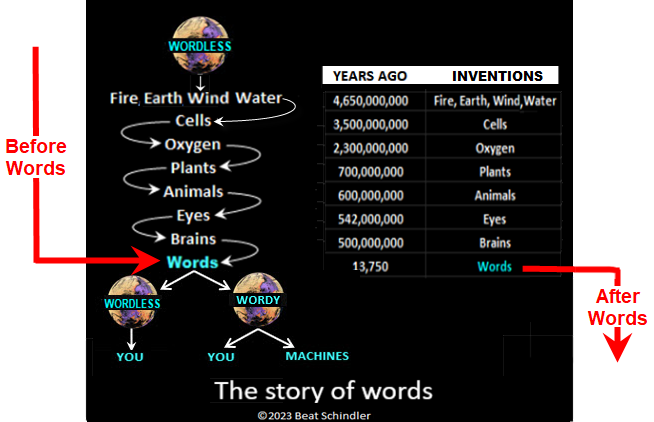
For the sake of telling the entire story of words, let me also add those parts that most word-users are familiar with, given that their stories are sometimes also told.
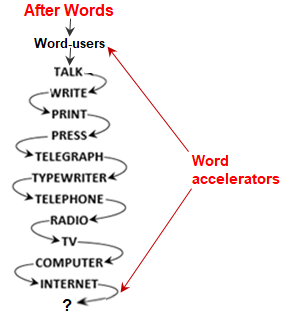
“Word accelerators” means that just as the chicken was the egg’s idea for getting more eggs, so the word-users are the word’s idea for getting more words.
The latest in the chain of word accelerators, the world wide web — also known as the internet — currently gobbles up, stores, and disseminates more words faster than anything invented for that purpose before.
What have words got to do with you?
Because the story of words isn’t often told, it’s unlikely you’ve ever asked…
- “What is humanity?”
- “What is human?”
- “What is you?”
But that’s not all.
Looking for an answer is only the first step.
It also depends on what you ask.
Smartphone-internet-AI
If you ask your smart phone, the internet, or AI (the three are now the same), they’ll tell you that…
- “Humanity is the collective characteristics, qualities, and behaviors that define humans.”
- “Human refers to a member of the homo sapiens.”
- “You is an AI language model developed by OpenAI.”
Think I’m kidding, aren’t you?
Well, I couldn’t help you to this much bullpoop and blatant lies if I tried. Worst of all, if I did, I’d be the first to know.
Your world-wide-web, smart phone, and AI don’t lie because for that they don’t have the organs required.
To lie takes a liar, that is a word-user who programs the world-wide-web, internet, smartphone, and AI to lie.
Because the word-users cannot describe the world and themselves, they can only describe how they see the world and themselves.
How do you think homo sapiens came about?
You
If you ask you about you, it’s unlikely that you’ll answer the question with another question, namely with…
“Have you ever thought of you as a word?”
If you’ve read “Word is great, beautiful, and oh so fascinating“, then you know that you couldn’t be anything else if it tried — a word.
In other words, I think we’re not asking the right questions.
I also think it’s time.
If not now, then when?
You, part 2
If you don’t know what you de-scribes, that means you don’t know you.
In China you is 你 and in France it is tu.
Therefore, if you say “You” to a Chinese or French child, it won’t understand. It won’t know what you’re talking about.
I don’t know you nor the children you might be talking to.
But I know words, you included.
On that I give you my word.
Describe
Unless words describe, they don’t mean a thing to anyone.
But to de-scribe doesn’t take words, it takes scribes.
Naturally, the scribes will always be word-users.
Word-users are animals that learned words at school.
Word-users
The word-users — you and me — have been busy de-scribing ourselves, and how we see the world, since the beginning of words. Not because there are any alternatives, but because there’s never been another way from the start.
As the saying goes, in the beginning is the word.
We do this because we’re the only specie on planet Earth with a Before Words and an After Words.
Simply put, we, the word-users, have words and the wordless — including the tea pots, mountains, plants, animals, and fictional figures such as Peter (the rabbit), gods, James Bond, piglet, and pooh, to name a few — don’t.
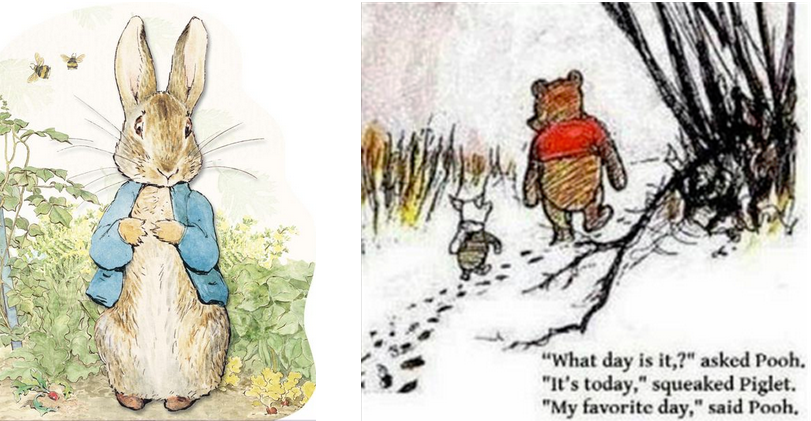
At the risk of repeating myself, I think we don’t ask the right questions.
Why do we name ourselves humanity, human, or homo sapiens?
Why don’t we instead name the animals human or homo sapiens?
When the lies told for thousands of years will finally be stopped, THE STORY OF WORDS can be told instead.
THE STORY OF WORDS
THE STORY OF WORDS tells…
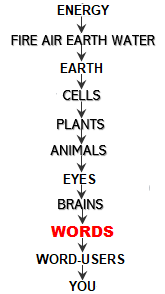
…that the first to speak the first word on Earth — our ancestors — were animals (presumably with eyes and brains).
Animals
We have the same lifecycle as other animals.
- We manage energy as animals manage theirs.
- We drink, we eat, and we eliminate as animals drink, eat, and eliminate.
- As any other animal, our parents mate, then we’re born, we learn to walk, we grow, and we mate in turn.
- But that’s not all.
- Then our parents die, all our friends die, and we die in turn.
But we’re animals with difference.
We have words and they — the other animals, plants, cells, water, earth, air, and fire — don’t.
That explains why stories made of words will always glorify the word-users.
Always have and always will.
It’s the only way.
Beyond the shadow of a doubt.
Call it a dream, it doesn’t change anything.
Comments
Comments are permitted, welcome, and appreciated.
Always eager to understand (as opposed to be understood).
I don’t do arguments but enjoy courageous conversations of mutual respect.
Feedback is a gift!
PS. Questions
Do you have any questions?
Book a FREE 15-minute consultation with me here.
Let’s chat!